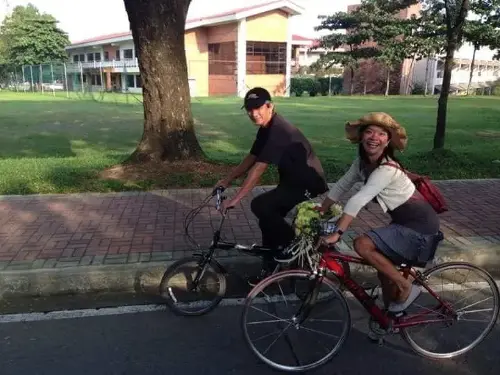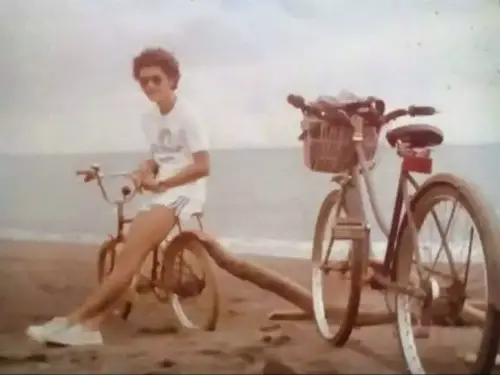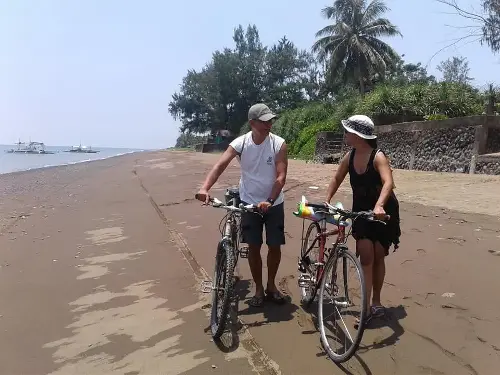
MANILA, Philippines – Karen Silva met the love of her life in a jeep, during a trip from Infanta, Quezon Province to Manila. He has curly hair, like her brother Pete, and he speaks English very well, she would later write to one of her sisters.
His name is Rosar Crisostomo — called Rocha by his friends — a young man from Infanta. Karen had been staying there for a month as a volunteer teacher for high school students preparing for college entrance examinations. They met on June 12, 1986.
Those days parts of the highway connecting Infanta to Manila were not yet paved. The jeep stopped in an eatery in Real town. Rosar got a bottle of San Miguel beer. Karen ordered a soda. She tried to pay for her drink, but it was already paid for.
They went out on their first proper date exactly a month after that first meeting. They biked on the way to the beach, which was six kilometers away from the school where Karen taught. She borrowed a Patria bicycle from her brother. Rosar’s bike had small, 20-inch wheels — perfect for cruising the Infanta coast overlooking the serene Pacific. The couple drank coconut wine in a shack nearby.
At the end of that first proper date, Karen was resting her head on the table, punch-drunk in love and lambanog.
In the days that followed, Rosar would pick up Karen from school with his beach cruiser. Two years later, they got married.
“You can see how I fell in love with him,” Karen said while showing a photo almost hazy with age. The lanky boy sported black wayfarers and a thin mustache. On his side was Karen. She wore a white dress and a shy but beaming smile, her face framed by large spectacles, side-swept bangs, and a short bob.
In 1988, they moved to Bataan and worked in the refugee processing center. On the west of the Bataan Peninsula is the South China Sea. That was years after the Vietnam War ended and many Vietnamese fled their homeland. They sought, along with some Cambodians and Laotians, temporary shelter in the Philippines while awaiting resettlement to other countries.
While the communist party took over Vietnam, refugees in Bataan were taking to heart what it meant to be a full-fledged American. Karen taught the English language in the camp, while Rosar taught American culture.
When time allowed after work, they biked along the shores of Morong. Staying there for five years inculcated in them an appetite for authentic banh mi, then sold for only P5 apiece, Karen recalled.

“That’s why we’re very picky, lahat ng anak ko, pinaglihi ko sa Vietnamese food,” said Karen. The couple had three children, the first two spending early years in Morong.
Every day, refugee center employees rode the bus to go to work. The bus arrived and left on the dot. This eventually became a problem. So they got a moped, a small motorcycle with pedals, for the times they missed the bus.
That moped stayed with their family as they moved to Kamias, Quezon City, in 1993. Rosar got a post in Ateneo and taught theology to undergraduates. He would bike to campus. Sometimes he would take his sons with them, who were attending classes the same school. He said he was one of the very few teachers who rode a bike to work.
There was nothing noble in riding the bicycle, Rosar said. “I just got used to it.”
It was convenient and cheap. Rosar wasn’t trying to advocate for anything. Back in Infanta, his grandfather used to run a bike rental service. Then in the 2000s he joined a group of cyclists that organized an annual bike ride called the Tour of the Fireflies. They were calling for clean air and trying to get more people on bikes.
It made sense. He realized cycling was good for the environment. “There [are] no toxic fumes emitted by cycling,” he said.
Karen and Rosar’s involvement in advocacy groups changed over the years, in the same way the advocacy and perceptions of the bicycle transformed with passage of time.
The bicycle, that humble machine, has evolved not only in mechanics but in meaning. It captures choice, rebellion, alternative, freedom, pure fun and shared misery. It is used by the politician running a campaign, radicals urging a movement forward. The world’s best athletes use it in a show of superhuman strength, in epic tours set across breathtaking landscapes.
But a bicycle is really just a bicycle. That’s where the charm lies.
It is used to go from one place to another. From point A to point B. From the house to the school. For Karen and Rosar, their bikes took them from Quezon City to Nasugbu, Batangas. Through the winding road to Sierra Madre. To the lion’s head statue along Kennon Road. To Sabang beach where one can spend the day staring mindlessly at the incessant Pacific swell.

In Cebu province they rode from Bantayan to Bogo and then to Cebu City, riding a small boat with their bikes to get across the water. On stopovers, they would buy and drink beer from roadside stores along the way.
“We have to continue doing things together. Commuting by bicycle gives us a chance to do things together,” said Rosar. His crop of curly hair is now all white, and instead of the black wayfarers he used to wear in his youth, he now has spectacles.
They still go back to Infanta (the roads now fully paved) and stay in the shack where they shared that first bottle of lambanog more than three decades ago. They call it the love shack.
In their house in Antipolo, two bikes and some rubber tires hang from the ceiling. Bicycle figurines decorate the house. One works as a clock. Empty bottles of coconut wine line the overhead racks. Their bed is in a corner under the stairs. Now in their 60s, it’s safer to put the essentials within reach.
On a Wednesday morning, the smell of pancakes wafted through the cold air. Karen was in front of the stove, a rare sight, she remarked herself. But the pancakes turned out fine. It is Rosar who does most of the cooking she said, while she busies herself cleaning the house. As she cooked, there was brewed coffee waiting, bacon and eggs already on the dining table squeezed in one corner of the house.
The days are winding slower. The nest is almost empty. Still, they go on rides together. It doesn’t matter how long or how short. Since their first proper date, it has always been about company.
“Every time we go out on our bicycles, it is like going out on a date,” said Karen. – Rappler.com
